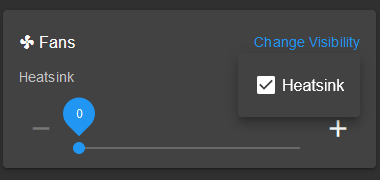PWM Fans
-
I have 2 PWM fans and can only see Fan 0 in DWC. This is a new build so will the fan eventually appear when I load a job? Here are the lines from config.g
; Fans
M106 P0 S0 I0 C"Heatsink" F500 H-1 ; Set fan 0 value, PWM signal inversion and frequency. Thermostatic control is turned off
M106 P1 S1 I0 C"Nozzle" F500 H1 T45 ; Set fan 1 value, PWM signal inversion and frequency. Thermostatic control is turned on
-
fans set up to be thermostatically controlled will not show up.
-
Fans that are defined a thermostatically controlled are not shown, because you can't change the speed manually.
BTW you appear to have the thermostatic control on the wrong fan, or else you have the fan names swapped.
-
-
@dc42 Can a thermostatically controlled fan be turned on at 70% instead of 100%. I'm trying to change the "S" value but it only seems to work when set to 1. This fan is too loud and on a mosquito hotend so I don't think I need all that speed/noise
-
This fan is too loud and on a mosquito hotend
I seem to recall other posts about this particular fan not responding to PWM control very kindly. You can try adding a blip of 100% at the start up with the B parameter of M106, and you can try experimenting with the PWM frequency. 10hz to 30000hz are viable range.
-
@Phaedrux Yeah I just found one thread about it. Seems like the solution was to get a 12V fan and a buck converter but the fan will still run at full speed? I played around with frequencies/speeds and blip time. The best I could do was erratic cycling with S.6 F10000
-
-
@Phaedrux Ok..I see that the buck converter gets connected to the board inputting 12V to the fans. I just need to convert my other fan to 12V too I suppose.
-
@jdjeff58 You haven't said what board you're using. If it's the Duet wifi or ethernet then yes, you only have one bank of fans to choose from. If it's a maestro board you have 2 fan banks with seperate power options so you could run 1 at 12v and the other at VIN of 24v.
-
@Phaedrux Duet Wifi yes. The only thing I'm not clear on is how to connect this buck converter. I've read the Duet tutorial on this and it points you to a link to show how to connect to a maestro and only connecting the positive output? What about the fan jumper? I've ordered the stuff to do this but could only find the typical vague duet tutorial.
-
@jdjeff58 There is this guide, which maybe you have seen, for the maestro but it also applies to the wifi. https://duet3d.dozuki.com/Guide/Ender+3+Pro+and+Duet+Maestro+Guide+Part+5:+Upgrades/54#s214
The positive output of the buck converter will be connected to the Vfan jumper pin, since it is that pin that provides power to the fan + terminals. Normally it's either jumpered to Vin or 5v. By connecting it directly to the output of the buck converter you're providing power to the fans directly. The negative leg of the buck converter output is not required since the fans will be connected to the fan port negative pins on the duet, and the duet switches the PWM signal on the negative side.
-
@Phaedrux Right....but right now Vin is 24V and the fan jumper is installed for Vin. What changes (if any) do I have to make to the present jumper for this mod? I don't want to let any smoke out.
-
@jdjeff58 you remove the jumper and connect to the middle vfan pin directly. The jumper just connects that pin to either the 5v or vin pins on either side of it.
-
@Phaedrux Ok now I get it. That makes sense. Thanks!